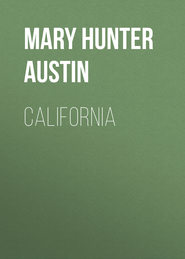По всем вопросам обращайтесь на: info@litportal.ru
(©) 2003-2024.
✖
The Lovely Lady
Настройки чтения
Размер шрифта
Высота строк
Поля
"Un giro"—Peter waved his arm seaward; the dip of the oar had a stealthy sound in the deserted dawning. They passed the public gardens and saw the sea widen and the morning quicken. Islands swam up out of silver space, took form and colour, and there between the islands he saw the girl. She had gotten another oar from Giuseppe and stood delighting in the free motion; her sleeves were rolled up, her hat was off, her hair blew out; alive and pliant she bent to the long sweep of it, and her eyes were on the morning wonder. But when she caught sight of Peter she looked only at him and he knew that her seeing him appearing thus on the shining water was its chief and exquisite wonder, and that she did not know what he saw. The gondolier steered straight for the girl without advice; he had thought privately that the Signore Americano was a little mad, but he knew now with what manner of madness.
They drew close and drifted alongside. Peter did not take his eyes from the girl's eyes lest for her to look away ever so slightly from there to his face would be to discover that he knew; and he did not know how he stood with himself toward that knowledge.
"Oh," she said breathlessly, "I wanted you—I called you—and you came! You did not know where I was and yet you came?"
"I heard you calling."
She left her oar and sat down; Peter laid his hand on the edge of her gondola and they drifted side by side.
"May I come with you?" he asked presently.
She made a little gesture, past all speech. Peter held up a hand full of silver toward his gondolier and laid it on the seat as he stepped lightly over. The man slid away from them without word or motion, and together they faced the morning. It was one thin web of rose and gold over lakes of burnished light; islands lifted in mirage, floated miraculously upon the verge of space. Behind them the mainland banked like a new created world over which waited the Hosts of the ranked Alps. Winged boats from Murano slid through the flat lagoons.
There was very little to say. Peter was aware chiefly, in what came from her to him, of the wish to be very tender toward it, of having it in hand to support her securely above the abyss into which he felt at the least rude touch of his, she must immeasurably fall. At the best he could but keep with her there at the point of her unconsciousness by knowing the truth himself, as he felt amazingly that he did know it with all the completeness of his stripped and beggared past.
They drifted and saw the morning widen into the working-day. Market boats piled with fruit, fish in shining heaps, wood boats of Istria, went by with Madonna painted sails. Among the crowded goods the women sat Madonna-wise and nursed their bambini, or cherishing the recurrent hope, knitted interminably. If he wanted any evidence of what he admitted between the girl and himself it flashed out for him in the faces of the market wives, on whom labour and maternity sat not too heavily to cloud the primal radiance. It was there in their soft Buon giorno in the way they did not, as the gondola drew beside them, cover their fruitful breasts from her tender eyes, in the way most fall, they grasped in the high mood of the forestieri a sublimity untouched by the niceties of bargaining. A man in the state of mind to which the girl's visible shine confessed, could hardly be expected to stickle at the price of the few figs and roses which served as an easy passage from the wonder of their meeting to the ground of their accustomed gay pretences. They made of Peter's purchases of fruit and flowers a market garden of their own from which they had but just come on hopeful errands. They made believe again as boats thickened like winged things in a summer garden, to be bent upon discovery, and slid with pretended caution under the great ships stationed by the Giudecca, from which they heard sailors singing. They shot with exaggerated shivers past a slim cruiser and suddenly Miss Dassonville clutched Peter by the arm.
"Oh!" she cried: "Do you see it? That little dark, impudent-looking one, and the flag?"
Peter saw; he was not quite, he reminded her, even in the intoxication of a morning on the lagoons with her, quite in that state where he couldn't see his country's flag when it was pointed out to him. They came alongside with long strokes, and sniffed deliciously.
"Ah—um—um–" said Miss Dassonville. "I know what that is. It's ham and eggs. How long since you've had a real American breakfast?"
"Not since I left the steamer," Peter confessed. "Now if I were to smell hot cakes I shouldn't be able to stand it. I should go aboard her."
Miss Dassonville saluted softly as they went under the bright banner.
"'Oh, say can you see by the dawn's early light,'" she began to sing and immediately a large, blooming face rose through a mist of faded whisker at the prow and they saw all the coast of Maine looking down on them from the rail of the Merrythought.
"United States, ahoy?" it said.
They came close under and Miss Dassonville hailed in return; as soon as the captain saw her face smiling up at him he beamed on it as the women in the boats had done.
"We smelled your breakfast," she explained, and the man laughed delightedly.
"I know what kind these Dagoes give ye. Come up and have some."
Peter and the girl consulted with their eyes.
"Are you going to have hot cakes?" she demanded.
"I will if you come; darned if I don't."
"We're coming, then."
It was part of the task that Peter had set himself, to persevere for Savilla Dassonville the film of unconsciousness that lay delicately like the bloom of a rare fruit over all that was at that moment going on in her, that made him hasten as soon as Captain Dunham had announced himself, to introduce her particularly by name. To forestall in the jolly sailor the natural interpretation of their appearance together at this hour and occasion, he had to lend himself to the only other reasonable surmise. If they were not, as he saw it on the tip of the good captain's tongue to propose, newly married, they were in a hopeful way to be. The consciousness of himself as accessory to so delightful an arrangement passed from the captain to Peter with almost the obviousness of a wink, as he surrendered himself to the charm of the girl's ethereal excitement.
He understood perfectly that his not being able to feel more of a drop from the pregnant mystery of her call and his high response to it, to the homely incident of breakfast, was due to Miss Dassonville's obliviousness of its being one. It was for her, in fact, no drop at all but rather as if they had pulled out for a moment into this little shoal of neighbourly interest and comfortable food, the better to look back at the perfect wonder of it, as from the deck of the Merrythought toward the fair front of the ducal palace and the blue domes of St. Mark's behind the rearing lion.
Although he had parted from her that morning with no hint of an arrangement for a next meeting, it had become a part of the day's performance for Peter to call for the two ladies in the afternoon, so much so that his own sense of the unusualness of finally letting the gondola go off without him, and his particular wish at this juncture not to mark his intercourse with any unusualness, led him to send off with it as many roses as Luigi could find at that season on the Piazza. Afterward, as he recalled that he had never sent flowers to Miss Dassonville before, and as he had that morning furnished her from the market boats past her protesting limitation, it was perhaps a greater emphasis to his desertion.
However, it seemed that the roses and nothing but the roses might serve as a bridge, delicate and dizzying, to support them from the realization of their situation, into which he had no intention of letting Miss Dassonville fall. He stayed in his room most of that afternoon, knowing that he was shut up with a very great matter, not able to feel it so because of the dryness of his heart, nor to think what was to be done about it because of the lightness of his brain.
It occurred to him at last that at St. Mark's there might be reflective silences and perhaps resolution. He felt it warm from the stored-up veneration of the world, and though he said to himself, as he climbed to the galleries, that it was to give himself the more room to think, he knew that it must have been in his mind all the time that the girl was there, as it was natural she should have come to the place where they had met. Even before he caught the outline of her dress against the pillar he found himself crossing over to the organ loft the better to observe her. Knowledge reached him incredibly across the empty space, as to what, over and above the pictured saints, she faced there in the vault, lit so faintly by the shining of its golden walls. The service of the benediction going on in the church below furnished him with the figure of what came to him from her as she laid up her thoughts on an altar before that mysterious intimation of maternity which presages in right women the movement of passion. He felt himself caught up in it purely above all sense of his personal insufficiency.
Back in his hotel after dinner he found he had still to let the roses answer for him as he sat out on his balcony and realized oddly that though he had no right to go to Miss Dassonville again until he had thought out to its furthermost his relation to her, he could, incontinently, think better in her company.
It was not wholly then with surprise, since he felt himself so much in need of some compelling touch, that he heard, after an hour of futile battling, the Princess speak to him.
She stood just beyond him in the shadow of the wistaria that went up all the front of the balcony, and called him by his name.
"Ah," said Peter "I know now who you are. You are the one who stayed."
"How did you find out?"
"Because the one who ran away was the one he would have married."
He did not look at the Princess, but he saw the shadow of her that the moon made, mixed with the lace of the wistaria leaves, tremble.
"Well," said she, "and what are you going to do about it?"
"You know then …?"
"I was there on the water with you this morning.... It was I that showed you the way, but you had no eyes for anything."
It was the swift recurrent start of what he had had eyes for that kept Peter silent long enough for the Princess to have asked him again what he was going to do about it, and then–
"The other night—with the music—she knew that I was there?"
"Oh—she!" He was taken all at once with the completeness with which in his intimate attitude to things, Savilla did know. "She knows everything."
"What was there so different about the other one?"
"Everything … she was beautiful … she was air and fire … she made the earth rock under me."
"And did you go to her calling?"
"I would have risen out of death and dust at her slightest word … I would have followed where her feet went over all the world."
"And why did you never?"
"I suppose," said Peter, "it was because she never called."
"This one," suggested the Princess, "would be prettier if she were not so thin; and she wouldn't have to wear shirtwaists if you married her. She makes them herself, you know. Why did the other one run away?"
"That's just the difficulty. I can't remember." He wished sincerely within himself that he might; it seemed it would have served him somehow with Miss Dassonville. "I've been very ill," he apologized.
"Anyway, you'd be getting what everybody wants."










